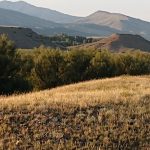
Our Big Fall Sale continues with many fresh, new plants added. We are continually propagating and potting up plants, and some of them are just ready now, just in time to go on sale at 25% off!
Our 2022 Deep Discount Area opens today & our Big Fall Sale continues, with 25% off for everyone! Included in this week’s sale are:
Sept. 6 thru 11 Enjoy:
- 25% off perennials, grasses, vines, shrubs, and trees
- 20% off Roses. Note: the discount on roses will not increase
- 20% off Compost Tea.
No discounts on fruit trees, veggie starts, and bulbs.

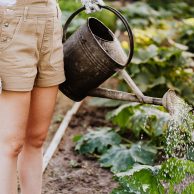
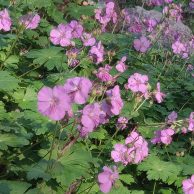 Hardy Geraniums are some of the most versatile an adaptable perennials for our area! Available in many colors and habits, they can be useful in sun and shade, moist and dry, as individual specimens, companion plants and ground covers.
Hardy Geraniums are some of the most versatile an adaptable perennials for our area! Available in many colors and habits, they can be useful in sun and shade, moist and dry, as individual specimens, companion plants and ground covers.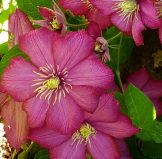
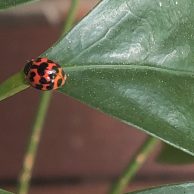 The Good News is that out of about 900,000 insect species currently living on our planet, only 1% to 3% are pests. We do not need systemic neonicotinoids (neonics) or any toxic pesticides to grow plants well. The solution is to employ human attention, biodiversity, nutrient-dense soils, application of nontoxic management, and tolerance.
The Good News is that out of about 900,000 insect species currently living on our planet, only 1% to 3% are pests. We do not need systemic neonicotinoids (neonics) or any toxic pesticides to grow plants well. The solution is to employ human attention, biodiversity, nutrient-dense soils, application of nontoxic management, and tolerance.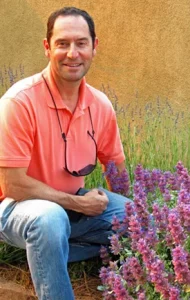 With great sadness, we share the news that the pioneering plantsman David Salman passed away on the fifth of June. David was a dedicated, passionate, and articulate educator and proponent of sustainable gardening, a plant explorer with a gift for selecting and introducing exceptional plants for western landscapes, and the founder of Santa Fe Greenhouses, High Country Gardens, and Waterwise Gardening.
With great sadness, we share the news that the pioneering plantsman David Salman passed away on the fifth of June. David was a dedicated, passionate, and articulate educator and proponent of sustainable gardening, a plant explorer with a gift for selecting and introducing exceptional plants for western landscapes, and the founder of Santa Fe Greenhouses, High Country Gardens, and Waterwise Gardening. 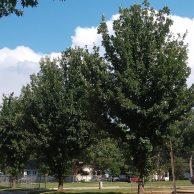 Bur Oak (Quercus macrocarpa) is a majestic, slow-growing tree reaching 60 to 70’ in height and spread, and is typically very long-lived (think 200, 300+ years!). It’s the sort of tree you plant for the benefit of the generations to come. Many oak species don’t thrive in Colorado’s alkaline soils, but Bur Oak is a happy exception. It is also drought-tolerant once established, even in dry clay, and can handle city conditions quite well. Bur Oak’s strong wood and strong, almost right-angled branch connections resist breakage in wind and snow.
Bur Oak (Quercus macrocarpa) is a majestic, slow-growing tree reaching 60 to 70’ in height and spread, and is typically very long-lived (think 200, 300+ years!). It’s the sort of tree you plant for the benefit of the generations to come. Many oak species don’t thrive in Colorado’s alkaline soils, but Bur Oak is a happy exception. It is also drought-tolerant once established, even in dry clay, and can handle city conditions quite well. Bur Oak’s strong wood and strong, almost right-angled branch connections resist breakage in wind and snow. 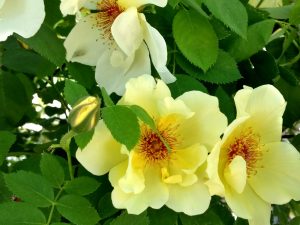 We are known far and wide for our selection of
We are known far and wide for our selection of 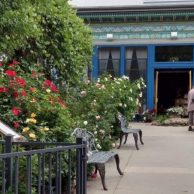 We would like to invite you to visit the Boulder-Dushanbe Teahouse Rose Garden in downtown Boulder across from the city park. The unique treasure of an intricately handcrafted, traditional Tajik Teahouse was gifted to the city of Boulder by the citizens of Dushanbe, Tajikistan, one of Boulder’s Sister Cities, in 1988. In time, the design of the structure was amended to be able to house a restaurant business, construction was completed, and the Teahouse opened in spring of 1998. Both the inside and outside of this fabulous building are elaborately adorned with colorful carved, painted and sculpted elements, mostly traditional, plus some contemporary artistry.
We would like to invite you to visit the Boulder-Dushanbe Teahouse Rose Garden in downtown Boulder across from the city park. The unique treasure of an intricately handcrafted, traditional Tajik Teahouse was gifted to the city of Boulder by the citizens of Dushanbe, Tajikistan, one of Boulder’s Sister Cities, in 1988. In time, the design of the structure was amended to be able to house a restaurant business, construction was completed, and the Teahouse opened in spring of 1998. Both the inside and outside of this fabulous building are elaborately adorned with colorful carved, painted and sculpted elements, mostly traditional, plus some contemporary artistry. 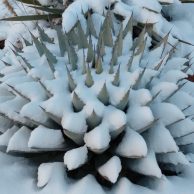
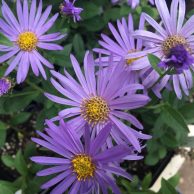
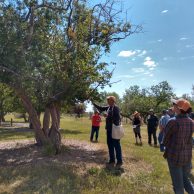 In late June Eve and Mikl attended two inspiring events that are related in that both organizations / institutions are concerned with researching, trialing, and introducing plants that are resilient in the face of the challenges presented by Climate Change, especially increasing heat and long-term drought.
In late June Eve and Mikl attended two inspiring events that are related in that both organizations / institutions are concerned with researching, trialing, and introducing plants that are resilient in the face of the challenges presented by Climate Change, especially increasing heat and long-term drought. 
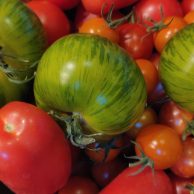 A FEW of our FEATURED TOMATOES
A FEW of our FEATURED TOMATOES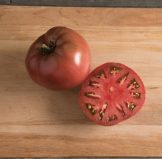 This taste-test winning, hard-to-find heirloom is one of the darkest ‘black’ tomatoes, with delicious, rich, smoky-sweet, complex flavor; pretty 8-14oz. purple-brown fruits are resistant to radial cracking. Big, 5-7’ productive, regular-leaf plants are healthy and tolerate heat and dry conditions.
This taste-test winning, hard-to-find heirloom is one of the darkest ‘black’ tomatoes, with delicious, rich, smoky-sweet, complex flavor; pretty 8-14oz. purple-brown fruits are resistant to radial cracking. Big, 5-7’ productive, regular-leaf plants are healthy and tolerate heat and dry conditions.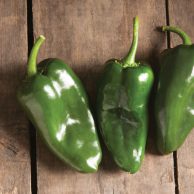
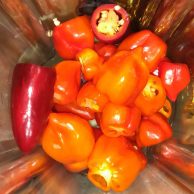
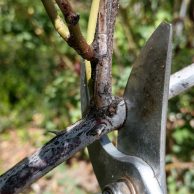 We recently passed Boulder Valley’s “average last frost” date (May 9).With all this rain, it sure feels like Spring! Lots of gardeners are asking if it’s safe to prune now, especially roses and shrubs. The answer is YES! But…..
We recently passed Boulder Valley’s “average last frost” date (May 9).With all this rain, it sure feels like Spring! Lots of gardeners are asking if it’s safe to prune now, especially roses and shrubs. The answer is YES! But…..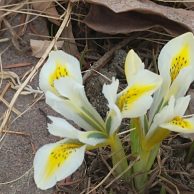
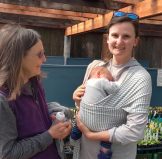
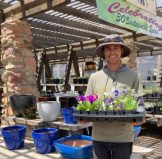 This week, we invite you to visit us and choose some new plants to nurture and mother. And honor the Mothers in your life with the plants, garden items, books, classes or healthy products they’d love. We have a beautiful line of glazed pots for patios, entryways and balconies. Our organic pepper, tomato, and herb starts are pouring in, as are many new perennials and shrubs, roses, vines, grasses, and annuals, all neonic-free. We also have plenty of fruit trees and berry bushes, and seeds for delicious summer crops like beans, basil, cucumber, zucchini, pumpkin, and melon, and glorious pollinator-supporting flowers like Lace Flower, Poppy, Zinnia, Sunflower, Nasturtium, Gloriosa Daisy, Cosmos, Morning Glory, and many, many more!
This week, we invite you to visit us and choose some new plants to nurture and mother. And honor the Mothers in your life with the plants, garden items, books, classes or healthy products they’d love. We have a beautiful line of glazed pots for patios, entryways and balconies. Our organic pepper, tomato, and herb starts are pouring in, as are many new perennials and shrubs, roses, vines, grasses, and annuals, all neonic-free. We also have plenty of fruit trees and berry bushes, and seeds for delicious summer crops like beans, basil, cucumber, zucchini, pumpkin, and melon, and glorious pollinator-supporting flowers like Lace Flower, Poppy, Zinnia, Sunflower, Nasturtium, Gloriosa Daisy, Cosmos, Morning Glory, and many, many more!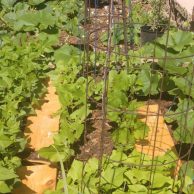 Okay, you prepared your soil and planted your vegetable garden with all kinds of wonderfully flavorful, nutritious foods, you’re watering and watching them grow, and wondering ….. When can I start to eat them, how do I harvest them, and how do I get the most out of these plantings? Here are some tips on vegetable crops harvest timing and techniques that may not be self-evident. Even if you’re a seasoned gardener, you may not be aware of some of these procedures!
Okay, you prepared your soil and planted your vegetable garden with all kinds of wonderfully flavorful, nutritious foods, you’re watering and watching them grow, and wondering ….. When can I start to eat them, how do I harvest them, and how do I get the most out of these plantings? Here are some tips on vegetable crops harvest timing and techniques that may not be self-evident. Even if you’re a seasoned gardener, you may not be aware of some of these procedures! 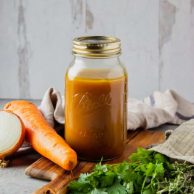
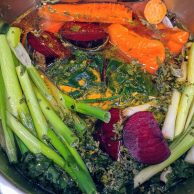
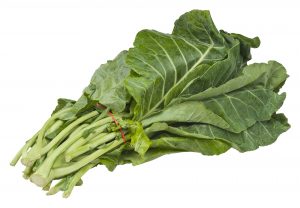
 Give yourself a break by putting away your lawn mower for the month of May with the additional benefit of feeding our early bees!
Give yourself a break by putting away your lawn mower for the month of May with the additional benefit of feeding our early bees!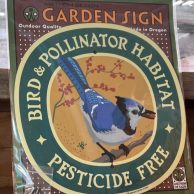

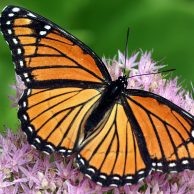 Monarch butterflies previously considered Threatened, have now been classified as Endangered by the International Union for Conservation of Nature, the world’s most comprehensive scientific authority on the status of species. Two major driving factors are habitat loss (and thus, food loss), and climate change.
Monarch butterflies previously considered Threatened, have now been classified as Endangered by the International Union for Conservation of Nature, the world’s most comprehensive scientific authority on the status of species. Two major driving factors are habitat loss (and thus, food loss), and climate change. 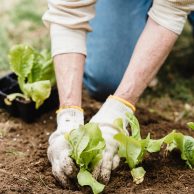 We are here for you! You’re in the high desert/steppe now, with short growing seasons, sudden temperature changes, unpredictable precipitation, low humidity, drying winds, alkaline soils that are low in organic matter and nitrogen, hot summers and cold winters. Despite these challenges, gardens can thrive here, and be productive, rewarding and beautiful!
We are here for you! You’re in the high desert/steppe now, with short growing seasons, sudden temperature changes, unpredictable precipitation, low humidity, drying winds, alkaline soils that are low in organic matter and nitrogen, hot summers and cold winters. Despite these challenges, gardens can thrive here, and be productive, rewarding and beautiful!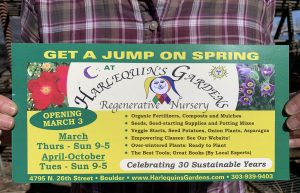 Opening Day will be here in just a few minutes (or it seems to our busy-bee staff!) and our doors will re-open this Thursday, March 3rd at 9 AM. We hope to see you then! Our hours for the month of March are Thursday through Sunday, 9 AM to 5 PM. Then beginning Tuesday, April 1st, our hours expand to six days a week, Tuesday through Sunday.
Opening Day will be here in just a few minutes (or it seems to our busy-bee staff!) and our doors will re-open this Thursday, March 3rd at 9 AM. We hope to see you then! Our hours for the month of March are Thursday through Sunday, 9 AM to 5 PM. Then beginning Tuesday, April 1st, our hours expand to six days a week, Tuesday through Sunday. 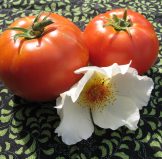 The bad news is that last week’s small delivery of tomato starts froze when the wind blew open the back door of our greenhouse in the middle of the night.
The bad news is that last week’s small delivery of tomato starts froze when the wind blew open the back door of our greenhouse in the middle of the night.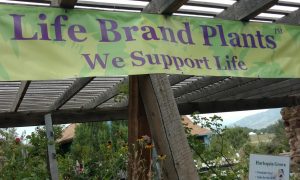 This morning’s broadcast of
This morning’s broadcast of 
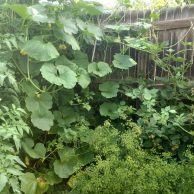 What a glorious spring! Having been blessed with generous snow and rain, the land is bursting with energy, greener than green, and flowering in kaleidoscopic exuberance! Migratory birds have been arriving or passing though our region this month, offering sightings of avian treasures like Lazuli Buntings and Western Tanagers, not to mention the hummingbirds. We do live in a wondrous world!
What a glorious spring! Having been blessed with generous snow and rain, the land is bursting with energy, greener than green, and flowering in kaleidoscopic exuberance! Migratory birds have been arriving or passing though our region this month, offering sightings of avian treasures like Lazuli Buntings and Western Tanagers, not to mention the hummingbirds. We do live in a wondrous world!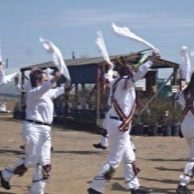 Our Annual May Day Festivities and Spring Sale begin May 4th!
Our Annual May Day Festivities and Spring Sale begin May 4th!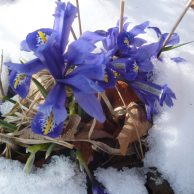 Like miniature iris emerging from the warming soil, March launches Harlequin’s Gardens early spring season, and our doors will re-open on Thursday, March 3rd. Our hours for the month of March are Thursday through Sunday, 9 AM to 5 PM. Then beginning Tuesday, April 1st, our hours expand to six days a week, Tuesday through Sunday.
Like miniature iris emerging from the warming soil, March launches Harlequin’s Gardens early spring season, and our doors will re-open on Thursday, March 3rd. Our hours for the month of March are Thursday through Sunday, 9 AM to 5 PM. Then beginning Tuesday, April 1st, our hours expand to six days a week, Tuesday through Sunday.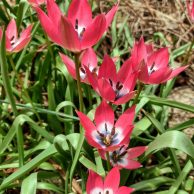 Stay tuned for our 2022 class listings, and as your spring-flowering bulbs emerge, refer to our
Stay tuned for our 2022 class listings, and as your spring-flowering bulbs emerge, refer to our 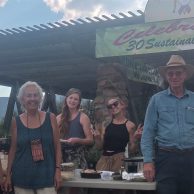 With the Thanksgiving holiday approaching, we’d like to take this opportunity to express our gratitude for another great year, our 30th!, at Harlequin’s Gardens.
With the Thanksgiving holiday approaching, we’d like to take this opportunity to express our gratitude for another great year, our 30th!, at Harlequin’s Gardens.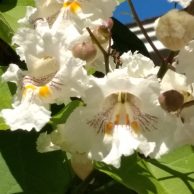 So they can support us!
So they can support us!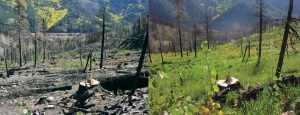
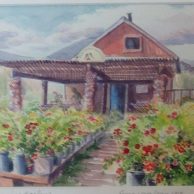
 Our hearts go out to the many people who suffered devastating losses in the Marshall wildfire. It may be possible to rebuild homes, but their contents may be irreplaceable and the sudden disruption to lives will present great challenges. Communities will also need to be rebuilt, and we are hoping the larger community will continue to step up to offer long-term support to all those in need. It takes a village!
Our hearts go out to the many people who suffered devastating losses in the Marshall wildfire. It may be possible to rebuild homes, but their contents may be irreplaceable and the sudden disruption to lives will present great challenges. Communities will also need to be rebuilt, and we are hoping the larger community will continue to step up to offer long-term support to all those in need. It takes a village! 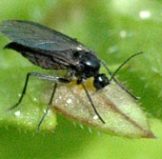
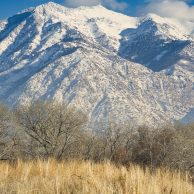 Historically February is one of Colorado’s snowiest months, and finally we’re beginning to see evidence of that this year! Additionally, the forecast indicates more to come. It remains to be seen how some of our marginally hardy garden plants have suffered from the below zero temperatures.
Historically February is one of Colorado’s snowiest months, and finally we’re beginning to see evidence of that this year! Additionally, the forecast indicates more to come. It remains to be seen how some of our marginally hardy garden plants have suffered from the below zero temperatures.
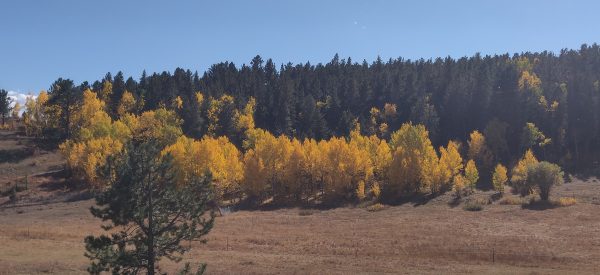
 This year the Winter Solstice will fall on Tuesday, December 21st. This astronomical event is the time of the year when the Earth’s north pole is tilted farthest from the sun, so that night is the longest and daylight is the shortest (in the northern hemisphere). This day has long been celebrated because it signals the lengthening of the days until Summer Solstice on June 21. Even though there is a lot of winter left, there will be more day light. It is the promise of Spring to come.
This year the Winter Solstice will fall on Tuesday, December 21st. This astronomical event is the time of the year when the Earth’s north pole is tilted farthest from the sun, so that night is the longest and daylight is the shortest (in the northern hemisphere). This day has long been celebrated because it signals the lengthening of the days until Summer Solstice on June 21. Even though there is a lot of winter left, there will be more day light. It is the promise of Spring to come. 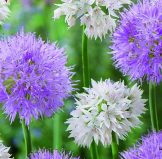
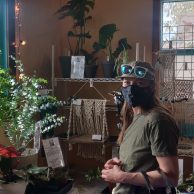
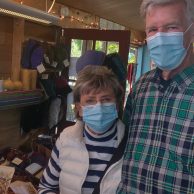 We are appreciative of the community support at our Holiday Market opening weekend! With the perfect autumnal weather, more people than ever were able to enjoy our local musicians, Sandra Wong & Jon Sousa’s world music, and Margot Krimmel’s traditional and original harp pieces.
We are appreciative of the community support at our Holiday Market opening weekend! With the perfect autumnal weather, more people than ever were able to enjoy our local musicians, Sandra Wong & Jon Sousa’s world music, and Margot Krimmel’s traditional and original harp pieces.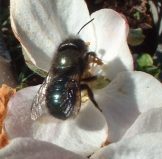 Mason Bee populations plummeted throughout Boulder County due to harsh spring weather, so it’s especially important to coddle them this winter! Mason bees normally nest in holes in tree trunks, which offer stable temperature, moisture, and protection from predators. To provide extra assistance, bring your Mason and other native bee tubes/cocoons into a sheltered place with ambient (outdoor) temperatures, but with less fluctuation, like a garage or refrigerator. Cocooned bees are now adult and safe to handle in their cocoons. If you used liners or reeds, take them out of the guard tubes and shelters and store them in the fridge. Ideally, unwrap the liners/reeds and just overwinter the mason bee cocoons. Place them in a Humidi-bee chamber (in stock), and keep the lower pad moist.
Mason Bee populations plummeted throughout Boulder County due to harsh spring weather, so it’s especially important to coddle them this winter! Mason bees normally nest in holes in tree trunks, which offer stable temperature, moisture, and protection from predators. To provide extra assistance, bring your Mason and other native bee tubes/cocoons into a sheltered place with ambient (outdoor) temperatures, but with less fluctuation, like a garage or refrigerator. Cocooned bees are now adult and safe to handle in their cocoons. If you used liners or reeds, take them out of the guard tubes and shelters and store them in the fridge. Ideally, unwrap the liners/reeds and just overwinter the mason bee cocoons. Place them in a Humidi-bee chamber (in stock), and keep the lower pad moist. 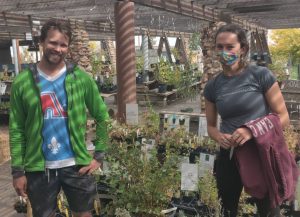 Our 2022 Fall Members-Only Sale has finished, and now our Big Fall Sale has begun, with 20% off for everyone! Plants included in this week’s sale are:
Our 2022 Fall Members-Only Sale has finished, and now our Big Fall Sale has begun, with 20% off for everyone! Plants included in this week’s sale are: